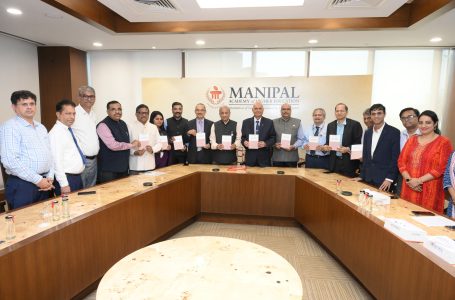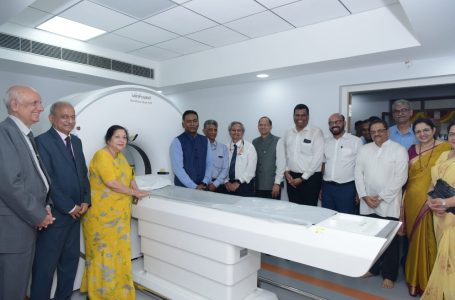W20-MAHE Women Vice Chancellors’ and Leaders’ Conclave” Unveiled at MAHE Bengaluru focusing on Women-led Development
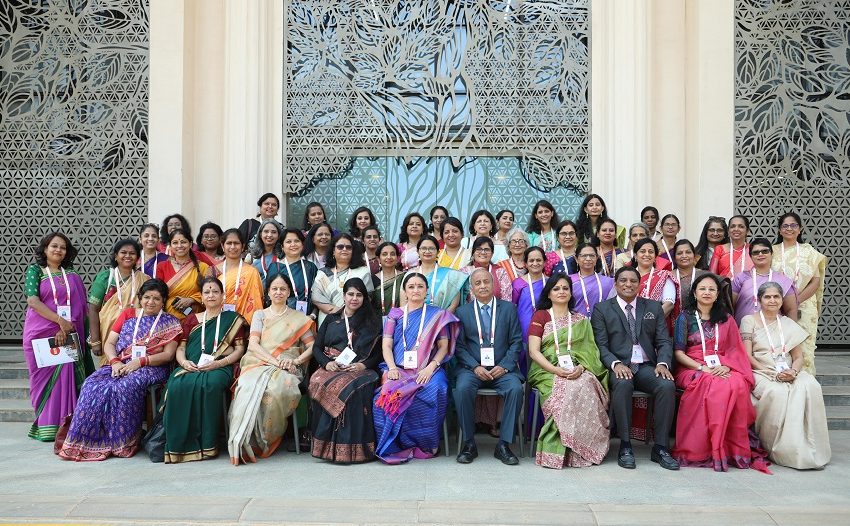
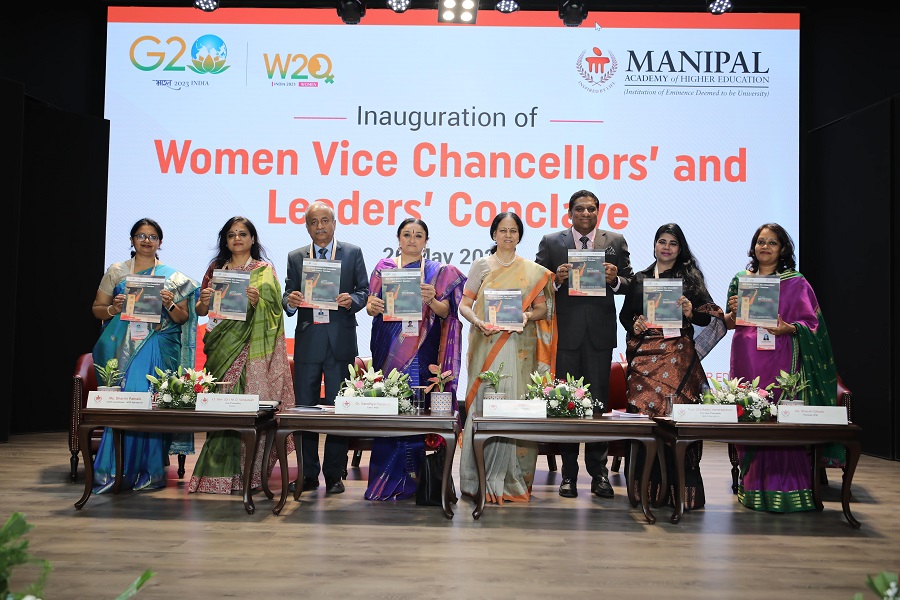
Bengaluru, May 26, 2023: The W20-MAHE Women Vice Chancellors’ and Leaders’ Conclave, titled “Women in Higher Education for Enabling Leadership” (WHEEL), commenced today at the Manipal Academy of Higher Education (MAHE) campus in Bengaluru.
More than 50 influential women leaders from various parts of India graced the event’s inauguration. During the ceremony, a Charter of Recommendations was unveiled, urging a shift from women’s development to women-led development, a vision shared by W20.
These recommendations, spanning five key themes – higher education, labor force participation, skill development, care work, and leadership – emphasized the integration of progressive gender perspectives into development policies and practices.
The gathering welcomed distinguished leaders including Professor Dr. Shalini Bharat, Vice Chancellor of TISS, Dr. Sandhya Purecha, Chair of W20, Dharitri Patnaik, Chief Coordinator of W20, Bharati Ghosh, former IPS and W20 Delegate, Lieutenant General Dr. M D Venkatesh, Vice Chancellor of MAHE, and Professor Madhu Veeraraghavan, Pro Vice Chancellor of MAHE, Bengaluru.
W20 serves as the official G20 engagement group dedicated to promoting gender equity. Its primary objective is to ensure that gender considerations are effectively integrated into G20 discussions and translated into concrete policies and commitments for gender justice and women’s empowerment within the G20 Leaders’ Declaration. MAHE acts as a knowledge partner to W20.
Delivering the keynote address, Professor Dr. Shalini Bharat, Vice Chancellor of Tata Institute of Social Sciences, highlighted the challenges faced by women worldwide in terms of access, acceptance, and advancement. She stressed the significance of placing women at the forefront of developmental ideas and practices in India and G20 countries.
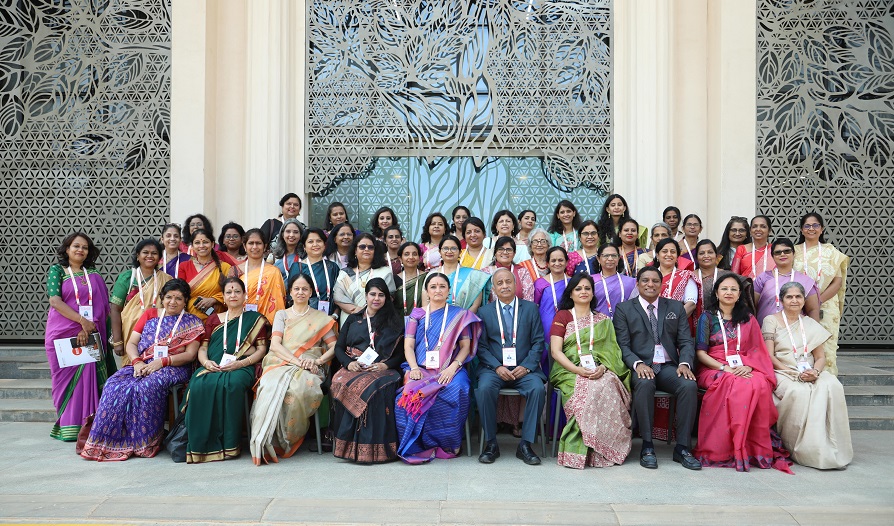
Dr. Bharat noted the prevailing gender bias that dissuades women from pursuing STEM disciplines, traditionally seen as male domains, which is a trend observed across all G20 nations where women’s enrollment in STEM courses does not exceed 45%. Moreover, Dr. Bharat underscored the influence of societal gender biases on women’s subject choices. She emphasized the complexity of women’s empowerment, considering intersecting factors such as caste, class, race, and disability. In addition to MAHE’s Charter of Recommendations, Dr. Bharat called for the creation of datasets that capture these intersecting complexities at micro-levels, comparable across G20 countries. She advocated for the grooming of women leaders in administrative and educational institutions to foster a level playing field.
Dr. Sandhya Purecha emphasized the importance of empowering and engaging with women leaders, highlighting the significant underrepresentation of women at all decision-making levels. She called for a redesign of skill development programs to ensure inclusivity and tangible outcomes. Furthermore, Dr. Purecha stressed the need to incorporate voices of women from diverse socio-economic, cultural, and minority backgrounds to comprehensively address gender inequality.
Providing a grassroots perspective on women’s empowerment, Bharati Ghosh, former IPS officer and W20 Delegate, shared her experiences in tackling gender inequality. She shed light on the adverse impact of digital poverty on women and girls and commended the prioritization of women-led development within the national development agenda.
Dharitri Patnaik, Chief Coordinator of W20 Secretariat, emphasized the imperative need to bridge the gender digital divide and highlighted measures undertaken by G20 countries in this regard. Ms. Patnaik called for making digital inclusion a national priority and urged Vice-Chancellors to establish platforms for women’s leadership. She also discussed India’s potential for leveraging educational technology to empower women.
In his welcome address, Lt. Gen. Dr. M D Venkatesh, Vice Chancellor of MAHE, expressed the significance of conclaves like this in advancing gender equality and empowering women to create a society that embraces gender inclusivity. Recognizing the pivotal role women play in building a healthy society, he emphasized the importance of unleashing their potential for the betterment of our communities. Dr. Venkatesh took pride in MAHE’s recent recognition by Times Impact as a leading university in promoting gender equality, with women constituting nearly 45% of the faculty, 60% of the non-teaching staff, and 47% of the student body. He expressed his absolute pleasure in being part of this conference.
Prof. Dr. Madhu Veeraraghavan, Pro Vice Chancellor of MAHE Bengaluru, addressed the gathering on the topic of “Gender Justice and Higher Education – A MAHE Approach.” He highlighted the various challenges women face in their professional lives, ranging from limited access to quality higher education to fewer opportunities for labor force participation, as well as the burden of care work. Prof. Veeraraghavan emphasized the importance of forums like this conclave, which shed light on these underlying issues and pave the way for women’s progress.
Prof. Neeta Inamdar, Convenor and Head of Manipal Centre for European Studies, MAHE, extended a warm welcome to all the Women Vice-Chancellors and Leaders, acknowledging their significant contributions as changemakers in society. She expressed her belief that the Charter of Recommendations presented during the Conclave would be thoroughly discussed, deliberated upon, and further developed, ultimately making a meaningful impact on the lives of women across G20 countries and beyond. Referring to one of the recommendations, Prof. Inamdar emphasized the crucial need for generating data on various social indicators, as the lack of such data hinders evidence-based policymaking. Dr. Shilpa Kalyan, Head of the Department of Liberal Arts, Humanities, and Social Sciences and co-convenor of the Conclave, highlighted MAHE’s leading role in promoting gender diversity and inclusion.
The inauguration ceremony was followed by Nammoora Habba, an evening that showcased the vibrant folk dances of Karnataka. Day 2 of the Conclave will feature five focused panel discussions, with active participation from all 50 delegates, continuing the meaningful exchange of ideas and experiences.



